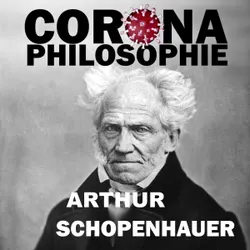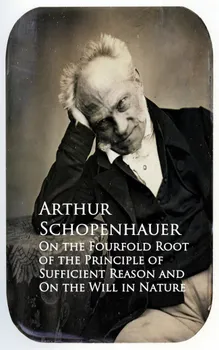"Just as if Kant had never existed, the Principle of Sufficient Reason still remains with Fichte what it was with all the Schoolmen, an œterna veritas: that is to say, just as the Gods of the ancients were still ruled over by eternal Destiny, so was the God of the Schoolmen still ruled over by these œterna veritates, i.e., by the metaphysical, mathematical, and metalogical truths, and even, according to some, by the validity of the moral law. These veritates alone were unconditioned by anything, and God, as well as the world, existed through their necessity. Thus with Fichte the Ego, according to the Principle of Sufficient Reason, is the reason of the world or of the Non-Ego, of the Object, which is the product or result of the Ego itself. He took good care, therefore, neither to examine nor to check the Principle of Sufficient Reason any farther. But if I had to indicate the particular form of this principle by which Fichte was guided in making the Ego spin the Non-Ego out of itself, as the spider its web, I should point to the Principle of the Sufficient Reason of Being in Space; for nothing but a reference to this principle gives any sort of sense or meaning to his laboured deductions of the way in which the Ego produces and manufactures the Non-Ego out of itself, which form the contents of the most senseless and—simply on this account—most tiresome book ever written. The only interest this Fichteian philosophy has for us at all—otherwise it would not be worth mentioning—lies in its being the tardy appearance of the real antithesis to ancient Materialism, which was the most consistent starting from the Object, just as Fichte's philosophy was the most consistent starting from the Subject.
On the Fourfold Root of the Principle of Sufficien and On the Will in Nature
Über dieses Buch
"Just as if Kant had never existed, the Principle of Sufficient Reason still remains with Fichte what it was with all the Schoolmen, an œterna veritas: that is to say, just as the Gods of the ancients were still ruled over by eternal Destiny, so was the God of the Schoolmen still ruled over by these œterna veritates, i.e., by the metaphysical, mathematical, and metalogical truths, and even, according to some, by the validity of the moral law. These veritates alone were unconditioned by anything, and God, as well as the world, existed through their necessity. Thus with Fichte the Ego, according to the Principle of Sufficient Reason, is the reason of the world or of the Non-Ego, of the Object, which is the product or result of the Ego itself. He took good care, therefore, neither to examine nor to check the Principle of Sufficient Reason any farther. But if I had to indicate the particular form of this principle by which Fichte was guided in making the Ego spin the Non-Ego out of itself, as the spider its web, I should point to the Principle of the Sufficient Reason of Being in Space; for nothing but a reference to this principle gives any sort of sense or meaning to his laboured deductions of the way in which the Ego produces and manufactures the Non-Ego out of itself, which form the contents of the most senseless and—simply on this account—most tiresome book ever written. The only interest this Fichteian philosophy has for us at all—otherwise it would not be worth mentioning—lies in its being the tardy appearance of the real antithesis to ancient Materialism, which was the most consistent starting from the Object, just as Fichte's philosophy was the most consistent starting from the Subject.
Starten Sie noch heute mit diesem Buch für 0 €
- Hole dir während der Testphase vollen Zugriff auf alle Bücher in der App
- Keine Verpflichtungen, jederzeit kündbar
Autor*in:
Sprache:
Englisch
Format:

200 Meisterwerke der Literaturgeschichte : Die größten Klassiker der Weltliteratur

100 Meisterwerke der Weltliteratur - Klassiker die man kennen muss : Bereicherte Ausgabe. Ein literarisches Panorama: Meisterwerke, Klassiker und Autoren der Weltliteratur

200 Literarische Meisterwerke der Weltgeschichte : Die größten Klassiker aus Deutschland, England, den USA, Russland und Frankreich

Arthur Schopenhauer: Die Kunst Recht zu behalten : Ein Grundlagenwerk der Philosophie

Die schönste Zeit - Weihnachten mit Meisterwerken der Weltliteratur : Bereicherte Ausgabe. Eine literarische Reise durch die Weihnachtszeit

Metaphysik: Zwischen flüchtiger Wahrheit und ewiger Suche : Entdeckungsreise durch Existenz und Realität: Von klassischen Ontologien zu ethischen Paradigmen

Die größten Klassiker der Weltliteratur : 200 Meisterwerke der Weltgeschichte

Vom Unterschiede der Lebensalter

Sei aufmerksam! Erkenne und handle! Die große Philosophie Hörbuch Box für ein bewussteres Leben : Vol. 2: Schopenhauer, Epiktet, de Montaigne, Seneca, Nietzsche und Stirner

Corona-Philosophie : Aus den Aphorismen zur Lebensweisheit

Arthur Schopenhauer: Aphorismen zur Lebensweisheit

Über das Geistersehn (Ungekürzt)
